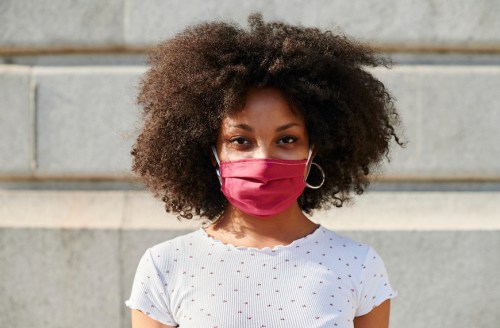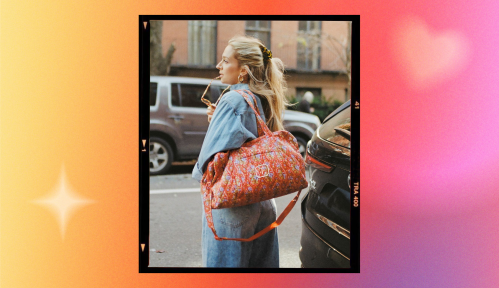Our editors independently select these products. Making a purchase through our links may earn Well+Good a commission
For much of last year, vaccination was the carrot hanging over our heads to get us through the unprecedented challenges of 2020. And for a brief window of time this year, vaccination relieved us of the extreme anxieties presented by the pandemic. But the emergence of the more contagious and dangerous Delta variant has reaffirmed that the pandemic is, sadly, far from over. So if you’re feeling lingering or resurgent COVID-19 anxiety even though you’re vaccinated, you’re not alone.
Experts in This Article
clinical psychologist, life fulfillment expert, and author of Date Smart, Joy From Fear, and Aging Joyfully
registered psychotherapist and founder of Bloom Psychology &
“Our hopes and expectation for a post-vax summer free of worry have been dashed,” says Carla Manly, PhD, clinical psychologist and author of Joy From Fear and Date Smart. “The Delta variant brings with it a new layer of uncertainty—and with uncertainty comes stress and worry. It’s easy to feel frustrated and anxious with the thought that we seem to be moving backward rather than forward.”
The pandemic has already tested our abilities to stay calm and nonreactive, she says, and a return to high levels of anxiety is the last thing our worn-out psyches need right now. In fact, Meghan Watson, MA, RP, a psychotherapist in Toronto, says that many individuals who have been anxious over the past year and a half are now, at this point in the pandemic, experiencing an even more challenging form of anxiety.
“It’s really hard to feel reassured when there are doomsday predictions around a fourth wave, or you’re seeing case spikes and hospitals are becoming overrun and doctors are pleading for people to get vaccinated,” says Watson. “That just feels nightmarish and is so much fodder for people’s anxiety.”
To be clear, vaccines are working. They may not be offering the same level of protection against the Delta variant as they were against prior variants, but they are still highly, highlyeffective at preventing serious illness, hospitalization, and disease. So if you have the vaccine, you are statistically extremely safe from the disease’s worst outcomes. Even so, it may be hard to challenge your anxieties around what is happening—especially with so much yet unknown. Still, there are strategies you can employ to ease your worried mind. Below, Watson and Dr. Manly outline big and small coping techniques to help you ride this next wave of uncertainty and fear.
1. Remember that anxieties are designed to help you—so, let them
Anxiousness is unpleasant, to say the least, but it’s not designed to torture us—even if that’s how it feels. “Anxiety is a cluster of experiences—thoughts, feelings, emotions, and physical symptoms—that result from activation of our sympathetic nervous system,” says Watson. “The sympathetic nervous system is activated when we’re under chronic stress, or we feel like we’re under threat, and anxiety is the long-term version of that acute fear over time.”
Since anxiety is actually supposed to be your friend who keeps you out of trouble, Watson posits that you can reframe your relationship with it. She recommends you examine the purpose of your anxiousness—what do your mind and body want you to protect against—and then identify what you can control in the situation to offer yourself some of the protection you crave.
“For someone super anxious about having to return to lockdown, you may not necessarily be able to control the decision of our governments and our public health officials,” Watson says. But, there are aspects of your life you can control. Beyond getting vaccinated, you can use your anxiety to continue wearing masks, to social distance when it’s appropriate, and try to minimize your risk where possible. Additionally, you can prepare yourself for any lockdown-related scenarios by examining any regrets you had about the last one and preparing to make the situation more comfortable.
While this strategy can be effective in diffusing anxiety, Watson admits it’s not always easy. “Many people don’t want to face their anxiety or the reality of what their anxieties may be preparing them for.” But the approach can help you realize that while some things are absolutely out of your control, there are things you can do and, in doing them, somewhat quiet the mind.
2. Schedule time to ruminate
If you can’t seem to stop thinking about the idea of another lockdown, fears of getting sick, or any aspect of pandemic life, says Watson, it means your brain is trying to solve that problem. This rumination can be distracting, pulling your focus from the present moment and onto this one issue your brain is desperate to resolve. “It feels really bad because we’re just dwelling and circling the drain of our anxious thoughts,” says Watson.
To avoid getting stuck in such a pattern, she recommends asking yourself if the issue is something that you can actually solve. If it is, Watson suggests setting aside a specific time to think it through, even going so far as to schedule 15 minutes on your calendar. “This allows it to be more contained and for the time spent ruminating to be more productive, ” says Watson. “And it’s not overflowing into all aspects of your life as much, allowing for a bit more peace.”
If it’s a problem that can’t be solved by your mind—for example, fearing that a family member will get sick when you have absolutely no control over whether or not that happens—Watson suggests using coping mechanisms are in your toolbox (like meditation or breathwork) to manage your emotions.
It can also be helpful to ask yourself if there’s a way to use your anxiousness, even if the problem can’t be solved, she says. If you’re worried about your mom getting ill, for example, this might look like making sure she’s vaccinated and wearing masks indoors and encouraging her to care for her general health by inviting her on walks or sending her meals. None of those actions can ensure she won’t get sick, but they might soothe your brain breathe a bit.
3. Remember that uncertainty is difficult
Human beings do not like uncertainty, full-stop. But Watson says it can be helpful to reconsider your relationship to the unpredictable in light of present circumstances. “Maybe you can reflect in your meditation practice or journal on what it’s like to exist in a place of uncertainty and be okay with it,” she suggests. “Think about whether or not there is a more adaptive way to approach it—is there someone in your life, perhaps, who deals with uncertainty in a way that you admire, and can you talk to them?”
And while Meghan admits this isn’t the most concrete tool on this list, she says it offers an opportunity to reflect on the amount of power you want to give uncertainty. After all, 10 or 15 years from now, we may look back at this time and think about what we wish we had done differently, but right now, we are driving blind, and there’s not much we can do about it. So, the only option (other than incessant worry) is to reframe our relationship to the unknown and try to accept it.
4. Let yourself feel grief, sadness, disappointment (and anything else)
The ongoing nature of the pandemic may have you in your feelings in more ways than one. In addition to anxiousness, you may also be feeling sadness, disappointment, or hopelessness. “There’s a sense of intolerable grief,” says Watson. “And sometimes we can grieve the big losses [e.g., the death of a loved one], but we can also be grieving the smaller losses, like the loss of ease in anticipating what the future will look like and planning for it—and those little losses add up.”
Everyday life was difficult enough before the pandemic, she points out, so navigating it now with a “cup” that’s “overflowing with grief and anxiety and frustration” takes all that much more effort. If you think about the present moment in this way, perhaps you can then allow yourself what Watson calls radical compassion. “The expectation that we won’t have these very human responses to these circumstances, and to sometimes intolerable grief, is unrealistic,” she says. “And we have to be committed to ourselves enough to realize that we have to experience these losses fully in order to open ourselves up to ease, contentment, and joy. We have to allow ourselves the humanity of being alive right now, in 2021.”
This moment may not be quite as scary as prior moments in the pandemic for those of us with access to vaccines, but there’s a disappointment to our present circumstance that can feel demoralizing. After all, we thought we’d be free to return to our pre-pandemic way of life, fear-free, and that’s not quite the case yet.
If you are struggling with this, it’s expected. Accepting that whatever you’re feeling is a normal human response can help you refrain from judging it or putting undue pressure on yourself to be above it. This can then allow you to fully experience it so that you can move through it to a better place.
5. Try to acknowledge that life has changed
Here’s a difficult truth to swallow: we will never be the same as we were before COVID-19—not as individuals, and not as a collective. Watson encourages you to get comfortable with this uncomfortable reality. Though no one wants to frame this deadly pandemic as having silver linings, Watson does think it’s helpful to acknowledge that not all change is “bad,” even if it is unwelcome. “There’s so much pressure to return to a sense of normalcy, and we still haven’t had time to address the idea that normal might not have been good, beneficial, or necessary for us.”
This last bit of advice hits home for me because, if I’m honest, I didn’t totally mind the slower pace of life the pandemic engendered in 2020. I missed my friends, I hated not getting to hug their new babies, I mourned the deaths of so many people globally, and I was scared all the time—those were negative changes, which I am now experiencing once more with the emergence of the Delta variant. But at the same time, it was a relief to have fewer commitments each week. Advancing my career wasn’t my top priority for the first time since I was 18 years old. And I really didn’t mind spending less each week (though that has changed since life opened up post-vaccination).
None of us are the same as we were before this, and that’s not all bad. So, it can be helpful to consider how this next phase of the pandemic might continue to mold you, your life (and, optimistically, the world) in some positive ways.
6. Lean on your anxiety-busting strategies from the peak of the pandemic
The one thing we have going for us right now that we didn’t last year—aside from vaccines, which are huge!—is that the situation in which we find ourselves is no longer quite as unprecedented as it once was. We’ve been here before, so we can try to lean on the coping strategies we learned the last time around. Here, psychologists offer additional methods for managing anxiety, e.g., installing new boundaries around media consumption, prioritizing (safe) socializing, and making plans for the future that you can look forward to, even if the future date at which you can live them is currently uncertain.
Ultimately, it’s helpful to maintain perspective—things are bad now relative to 2019, but they aren’t as bad as they were in 2020. And importantly, you survived. Acknowledging where you’ve been and how you made it through can help you find resilience in the face of whatever’s to come next. And whether you like it or not, your wannabe-friend, anxiety, likely paid a key role in that survival—allow it to do so again (without hijacking your brain) as you move forward through this year’s challenges.
Oh hi! You look like someone who loves free workouts, discounts for cult-fave wellness brands, and exclusive Well+Good content. Sign up for Well+, our online community of wellness insiders, and unlock your rewards instantly.
Sign Up for Our Daily Newsletter
Get all the latest in wellness, trends, food, fitness, beauty, and more delivered right to your inbox.
Got it, you've been added to our email list.











